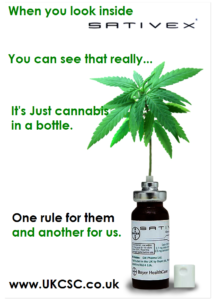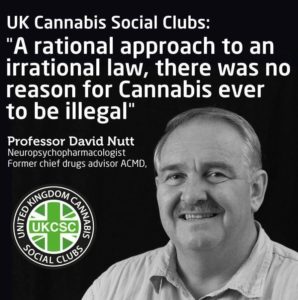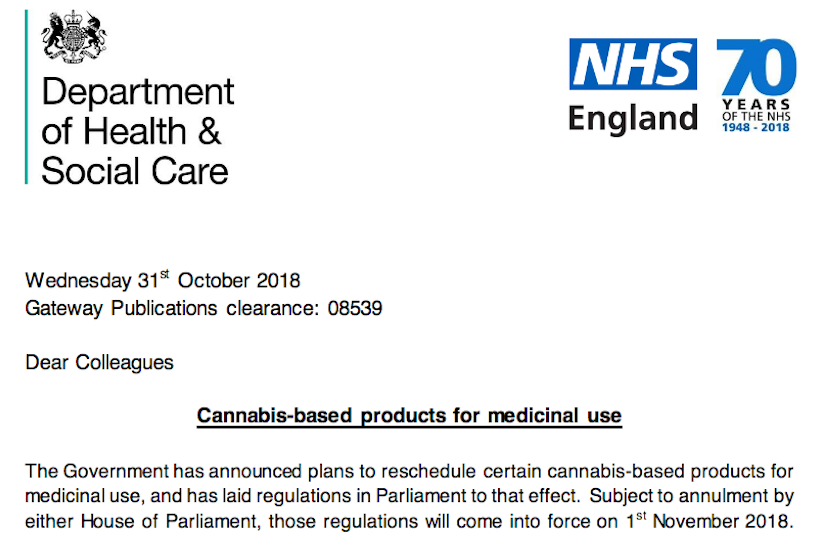With “cannabis-based” medicine becoming legal for specialist doctors to prescribe from 1 November, the Department for Health and Social Care has issued guidelines for specialists to follow.
These products can now be prescribed “medicinally where there is an unmet clinical need” by specialists, ie clinicians listed on the Specialist Register of the General Medical Council.
The Government has defined a cannabis-based product for medicinal use in humans as
a preparation or other product … which
(a) is or contains cannabis, cannabis resin, cannabinol or a cannabinol derivative (not being dronabinol or its stereoisomers);
(b) is produced for medicinal use in humans; and
(c) is
(i) a medicinal product, or
(ii) a substance or preparation for use as an ingredient of, or in the production of an ingredient of, a medicinal product.

Unlike Sativex – prescribed for spasticity in MS patients – which is a licensed product, cannabis products that have become prescribable will remain unlicensed. (Scandalously, a note on the guidelines acknowledges a “recommendation” not to prescribe Sativex because it is “not cost-effective” – ie it is too expensive.)
For patients the important point is this:
NHS England expects that cannabis-based products for medicinal use should only be prescribed for indications where there is clear published evidence of benefit or UK Guidelines and in patients where there is a clinical need which cannot be met by a licensed medicine and where established treatment options have been exhausted.” (Our emphasis.)
This seems to mean that a Crohn’s patient, for example, would be expected to try the chemo-type drugs currently offered before being allowed to move on to a cannabis product – surely an act of cruelty for those who do not want to go through the horrible side effects this entails, including the risk of leukemia or skin cancer if exposed to too much sunlight. Cannabis helps patients get out of the house, rather than trap them inside or make them allergic to the sun!
It seems like even if your specialist agrees that you might need access to cannabis they are required to review this with another specialist on their team who may not know a patient’s personal case well enough to agree, and adding yet another hoop to the process:
Any decision to prescribe must take into account the relevant GMC guidance and the relevant NHS Trust governance procedures for unlicensed medicines in the normal way. As a minimum, we would expect that approval for use is granted on a named patient basis by the Drug and Therapeutics Committee Chair or Trust Medical Director. It is also good practice to discuss use of cannabis-based products for medicinal use with a peer clinician in the same Specialist Register of the General Medical Council. Any such discussions should be appropriately documented.

On the positive side, there is clarification that CBD products are legal:
Products falling within Schedule 2 will contain varying quantities and ratios of THC and CBD and may be available in a range of pharmaceutical forms, including as the herbal material (grown as a medicinal product and passing a quality threshold) or as extracts formulated for example as oils and capsules. Manufacturers should adhere to Good Manufacturing Practice (GMP). ‘Pure CBD’ is not a controlled drug for the purposes of the 1971 Misuse of Drugs Act.
But there is also clarification that CBD products containing THC remain illegal, meaning CBD isolate products are going to be the only legal ones, and those people selling CBD products even with 0.2% THC are technically breaking the law. This includes the CBD flowers that people are selling in shops and online:
In the opinion of the Home Office, any CBD product that contains any amount of THC will be a controlled drug within the meaning of the 1971 Misuse of Drugs Act, except under very specific circumstances. Therefore using cannabis-based products that do not meet the official definition of a cannabis-based product for medicinal use (such as home-grown or street cannabis) for therapeutic benefit is illegal and potentially dangerous and patients should be reminded of this. The evidence that cannabis and some of its constituents can be addictive and harmful is well known and is not disputed by recent science.
In summary, this is medical cannabis product legalisation NOT legalisation of cannabis as a medicine. Unless the cannabis is produced in a GMP facility and prescribed to the named individual, it isn’t legal.
Someone just moved the goalposts and a whole lot of patients got tangled up in the net.
You can read the guidelines in full here.





Comments (2)